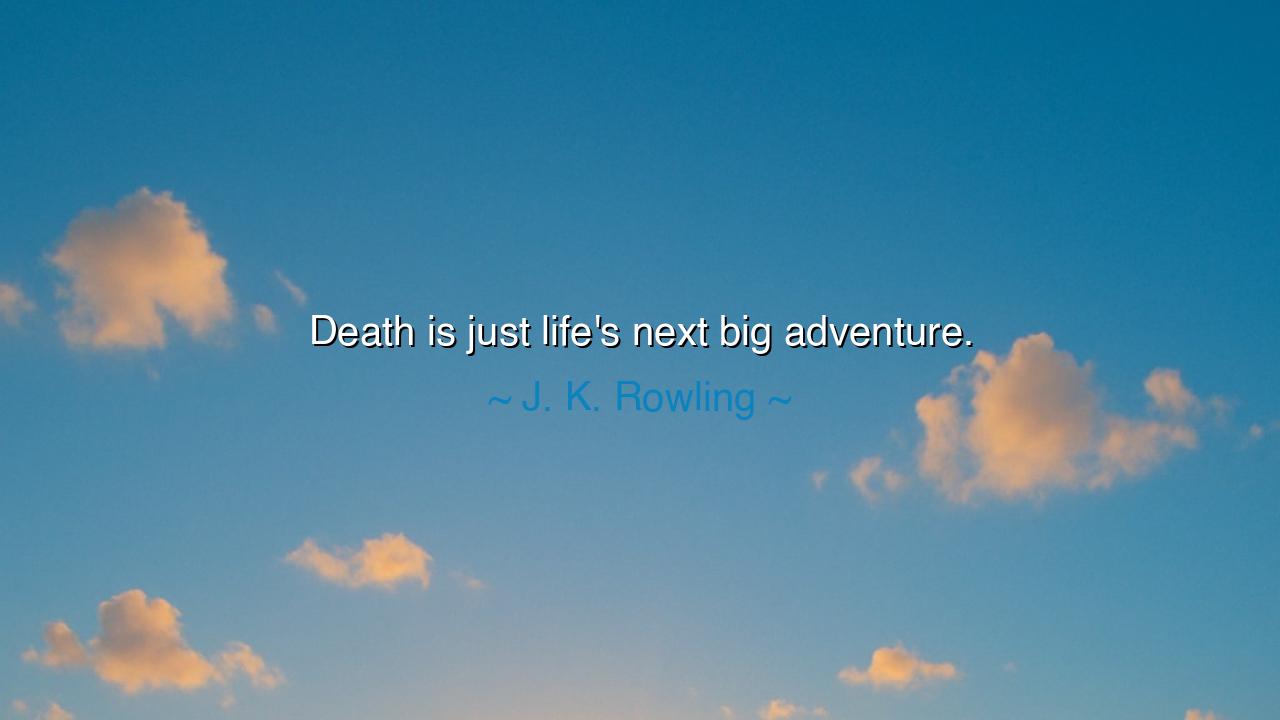
Death is just life's next big adventure.






“Death is just life’s next big adventure.” — so spoke J. K. Rowling, through the voice of a wizard who had long since looked beyond the veil of fear. These words, soft as twilight and bold as sunrise, carry a truth that humanity has wrestled with since the dawn of thought. They remind us that death, that most mysterious of thresholds, is not an end but a transformation — a continuation of the great journey of existence. To those who live in dread of it, the phrase sounds like defiance. To those who live with wonder, it sounds like a promise.
In the olden days, the sages and the poets knew this truth well. The Greeks spoke of the Elysian Fields, where heroes rested after their trials; the Egyptians wrote of the Field of Reeds, a paradise mirrored after life’s labors. Even the ancient philosophers, like Socrates, met death with calm, saying that a wise man ought not fear what he does not know — for it may be the greatest good. Rowling’s words echo these ancient voices. Life itself, she reminds us, is an adventure — a series of unknowns. If that is so, then why should its final chapter be anything less than another step upon the path of discovery?
Consider the story of Joan of Arc, a young maiden who faced death not with despair, but with fire in her eyes. At seventeen, she led armies under divine vision, and when the flames rose around her, she prayed not for rescue, but for courage. In that moment, her body perished — yet her spirit ignited a nation’s soul for centuries to come. Her life did not end in that square of smoke and ashes. No, it began anew, becoming a tale of faith, bravery, and eternal remembrance. Truly, death was her next great adventure, for it carried her name beyond the reach of time.
To see death as an adventure requires one to look with the heart of a traveler, not the heart of a prisoner. The traveler knows that every ending is a crossing — the dusk that leads to dawn. Life’s greatest fear is also its greatest teacher. Those who dare to live fully, embracing both joy and sorrow, are the ones who meet death not as a thief in the night, but as an old friend come to guide them home. For in truth, what we call “the end” is but a doorway into a new form of being, one unseen but deeply felt in every farewell and every sunrise.
Yet let this truth not make us careless or cold. To believe that death is an adventure is not to abandon life — it is to honor it more deeply. Knowing that our days are numbered gives them weight and brilliance. It teaches us to speak kindness before it is too late, to forgive before bitterness sets in, to love fiercely while love is near. For if death is the next great adventure, then living fully is the sacred preparation for that journey. Every act of courage, every moment of gratitude, every laughter shared — these are the provisions for the road ahead.
Look, then, at your own life. Ask yourself: am I walking this path as a fearful soul, or as a pilgrim of light? Do I hide from endings, or do I bless them as signs that the story continues? To live in fear of death is to live half a life. To embrace it as part of the cycle is to claim the full grandeur of existence — to see the world not as a fragile thing that slips away, but as an ever-turning spiral that carries us forward through time and spirit.
So, the lesson is this: Do not fear death, and you will learn to truly live. Treat each day as both an arrival and a departure, a chance to write something worthy in the book of eternity. Speak truth when silence tempts you, hold those you love as though it were your last sunrise, and chase the dreams that whisper in your blood. When your time comes — as it must for all — let your heart say, not “I am ending,” but “I am beginning again.”
For indeed, death is just life’s next big adventure — and the brave, the kind, and the wise will walk into it not with terror, but with wonder.






AAdministratorAdministrator
Welcome, honored guests. Please leave a comment, we will respond soon